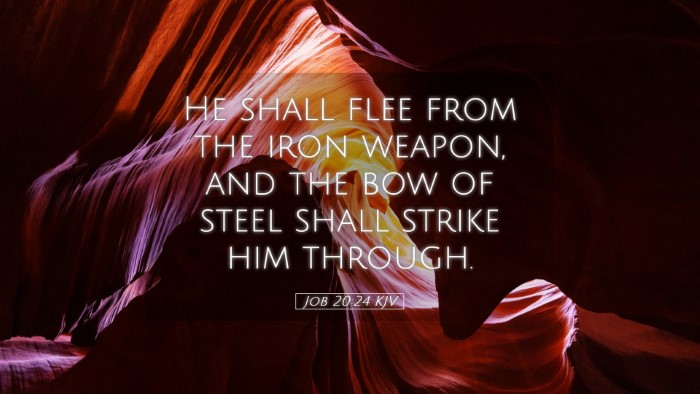Old Testament
Genesis Exodus Leviticus Numbers Deuteronomy Joshua Judges Ruth 1 Samuel 2 Samuel 1 Kings 2 Kings 1 Chronicles 2 Chronicles Ezra Nehemiah Esther Job Psalms Proverbs Ecclesiastes Song of Solomon Isaiah Jeremiah Lamentations Ezekiel Daniel Hosea Joel Amos Obadiah Jonah Micah Nahum Habakkuk Zephaniah Haggai Zechariah MalachiJob 20:24
Job 20:24 KJV
He shall flee from the iron weapon, and the bow of steel shall strike him through.
Job 20:24 Bible Commentary
Commentary on Job 20:24
Verse Context and Overview
Job 20:24 is part of a speech given by Zophar, one of Job's friends, who is addressing the situation of divine justice and the fate of the wicked. This particular verse reads:
“He shall flee from the iron weapon, and the bow of steel shall strike him through.”
The verse serves as a poignant statement on the inescapability of divine retribution, illustrating that despite any perceived fortunes of the wicked, their outcomes are ultimately assured by God's justice.
Insights from Public Domain Commentaries
Matthew Henry
According to Matthew Henry, this verse highlights the inevitable downfall of the wicked through divine intervention. He emphasizes that the “iron weapon” symbolizes the judgment of God, which is powerful and inescapable. Henry asserts that the imagery of being pierced by a “bow of steel” emphasizes the certainty and severity of judgment awaiting those who rebel against God. He notes that Zophar’s speech serves as a warning that no one can successfully evade the consequences of their sinful actions, and the very instruments of violence they might wield against others will ultimately be turned against them.
Albert Barnes
Albert Barnes provides a detailed examination of the imagery found in Job 20:24. He interprets "the iron weapon" as a representation of the harsh realities and fatal outcomes that await the wicked. Barnes stresses that despite any surface level prosperity, a deeper moral reckoning is assured. He notes that the phrase indicates a divine ‘drawing back’ of judgment upon the wicked, suggesting an almost surgical precision in how God dispenses His justice. In the grand narrative of Job, such discourse reflects the ultimate futility of defying God’s moral order.
Adam Clarke
Adam Clarke expands on the Hebrew terms used in this verse, noting that the metaphors convey an intense degree of conflict. Clarke particularly points out how “the bow of steel” signifies the strength of the divine judgment, an unyielding force that surpasses any earthly power. He argues that this verse serves both as a warning and a reassurance; it reassures the faithful of God’s omnipotence and the certainty that evil will not prevail. Clarke concludes that the persistent theme throughout Job highlights the righteous suffering, yet ultimately, God’s justice will right all wrongs.
Theological Themes
- Divine Justice: Each commentary reinforces the idea that God's justice is inevitable and inescapable.
- Vulnerability of the Wicked: The wicked may seem to prosper momentarily; however, they are vulnerable to God’s judgment.
- Imagery of Battle: The language of weapons implies an ongoing spiritual conflict between good and evil.
- Moral Order: The judgments depicted illustrate God’s sovereign authority in maintaining moral order in the universe.
Implications for Pastoral Care and Teaching
This verse can serve as a poignant reflection for pastors and theologians in teaching about the nature of God's justice. In pastoral care, it can be used to remind those who struggle with the seeming prosperity of the wicked that God's justice is perfect and will prevail in due time. Furthermore, in the context of discipleship, encouraging believers to remain steadfast in their faith, trusting that their struggles will not go unnoticed by God aids in building resilience amid adversity.
Conclusion
Job 20:24 serves as a powerful reminder of the moral consequences of human action as perceived through the lens of divine justice. The insights from Henry, Barnes, and Clarke illuminate the depth of meaning within this verse, guiding both scholars and laypersons alike into a richer understanding of the nature of sin, judgment, and redemption.


